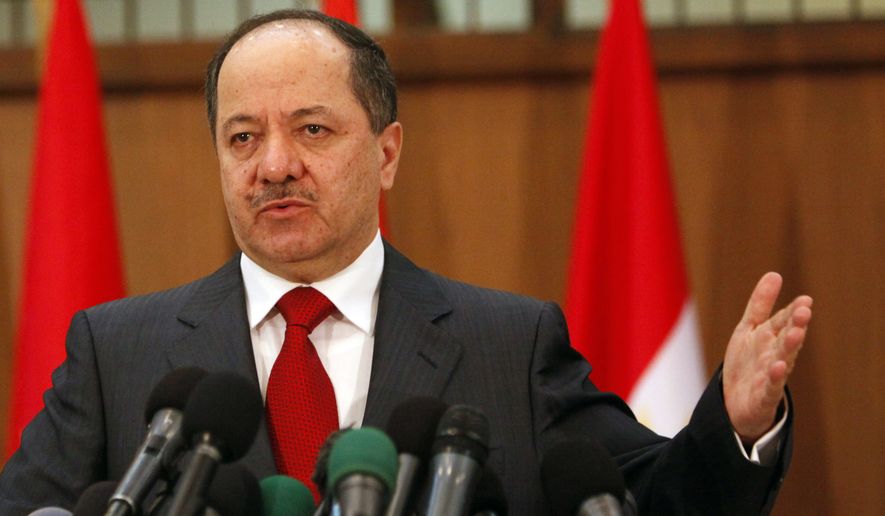The president of Iraqi Kurdistan says the creation of an independent Kurdish state in the Middle East is “now closer than at any other time” and is calling on world leaders to accept that the nearly century-old Sykes-Picot pact that resulted in the Mideast’s current borders has failed.
Massoud Barzani, who has led Iraqi Kurds for the past decade, has been saying since 2014 that the semi-autonomous Kurdistan Regional Government (KRG) intends eventually to declare independence. But his latest comments — during an interview published Friday by the Guardian — suggest the development may be imminent.
“I think that within themselves, [world leaders] have come to this conclusion that the era of Sykes-Picot is over,” Mr. Barzani told the U.K.-based newspaper. “Whether they say it or not, accept it or not, the reality on the ground is that. But as you know, diplomats are conservatives and they give their assessment in the late stages of things. And sometimes they can’t even keep up with developments.”
His remarks come just four months before the centennial of Sykes-Picot, the agreement that saw Britain and France carve spheres of influence from the ruins of the Ottoman Empire. Mr. Barzani told the Guardian that maintaining the status quo would ensure further regional disintegration and destruction.
The the issue of Kurdish independence, however, is a sensitive one and there is uncertainty over how the rest of the world — let alone the Iraqi central government in Baghdad — might respond.
A Kurdish state is expected to cause problems for Turkey, Iran and Syria, all of whom have sizable Kurdish minorities. While roughly five million Kurds live within KRG territory in Iraq, they make up roughly 10 percent of the populations of Iran and Syria, and nearly 18 percent of Turkey.
Turkey has been most resistant to the notion of Kurdish independence.
While relations between Istanbul and the KRG are seen to have warmed during recent years, the Turkish military has fought a decades-long campaign against Kurdish nationalists inside Turkey and long carried out military operations against Kurdish peshmerga fighters across the border in Iraq.
In his comments to the Guardian, Mr. Barzani said he is hopeful that Istanbul will accept an eventual Kurdish independence bid.
“We have not discussed this with Turkey, whether they are going to accept this or not. I don’t think [they would oppose it]. This is our national right. We are not a threat to anyone, but we don’t seek permission to exercise our rights,” he said.
Mr. Barzani and other Kurdish leaders have grown increasingly emboldened since Kurdish peshmerga fighters have taken a lead role in battling the Islamic State, also known as ISIS, ISIL and Daesh. The caliphate declared by terror group in 2014 encompasses a large swath of territory spanning the Syria and Iraq border and runs up against the edge of the KRG’s own semi-autonomous region.
For its part, the Obama administration has consistently said that the U.S. remains committed to a united, federal system in Iraq centered in Baghdad.
But Mr. Barzani has long voiced frustration about the Iraqi central government. During a visit to Washington in May 2015, the Kurdish leader said KRG relations with Baghdad were struggling amid tensions over Iraq’s oil revenues.
At the time, Mr. Barzani vowed that Kurds would hold a referendum on independence from Iraq when hostilities surrounding the war against the Islamic State is resolved.
“I cannot say if it will be in the next year, or when, but certainly the independent Kurdistan is coming,” he said at an event hosted by the Atlantic Council and the U.S. Institute of Peace in Washington.
• Guy Taylor can be reached at gtaylor@washingtontimes.com.




Please read our comment policy before commenting.